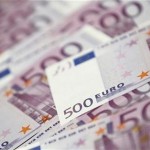Yesterday’s trade saw EUR/GBP within the range of 0.6935-0.6979. The pair closed at 0.6956, up 0.22% on a daily basis, which has been the first gain in the past six trading days. The daily low was 1 pip higher than Fridays low, as the latter been the lowest level since November 5th 2007, when the cross recorded a daily low of 0.6933.
At 8:26 GMT today EUR/GBP was up 0.16% for the day to trade at 0.6967. The pair touched a daily high at 0.6970 at 8:23 GMT.
Euro zone
A possible Grexit in 2016?
Economic experts said there still was a possibility for Greece to part ways with the common currency zone by the end of next year. 71% of respondents in a Bloomberg survey believed that might be the case. In addition, almost 50% of survey participants said the 86-billion-euro bailout might prove to be insufficient.
“Without some form of debt relief, the package will never be big enough,” Peter Dixon, a global economist at Commerzbank AG in London, said in a response to the survey, cited by Bloomberg. “Loading additional loans onto a country which cannot afford to repay them corresponds to Einstein’s definition of insanity: Trying the same thing over and over again in the expectation of different results.”
Meanwhile, today the Greek government submitted a bill to parliament, which is required by the countrys creditors in order to commence negotiations on the bailout package. The measures need to be adopted in the assembly until Wednesday night. Through it new European Union rules will be put into Greek legislation regarding the support of failed institutional lenders. The bill also features a set of new rules in regard to Greeces civil justice system.
Bond Yield Spread
The yield on German 2-year government bonds went as high as -0.205% on July 20th, or the highest level since June 16th (-0.204%), after which it slid to -0.210% at the close to gain 1.2 basis points (0.012 percentage point) on a daily basis.
The yield on UK 2-year government bonds climbed as high as 0.666% on July 20th, or the highest level since July 16th (0.666%), after which it fell to 0.632% at the close to lose 0.009 percentage point compared to July 17th.
The spread between 2-year UK and 2-year German bond yields, which reflects the flow of funds in a short term, narrowed to 0.842% on July 20th from 0.856% during the prior day. The July 20th spread has been the lowest one since July 16th, when the difference was 0.825%.
Meanwhile, the yield on German 10-year government bonds soared as high as 0.813% on July 20th, after which it slid to 0.757% at the close to lose 3.3 basis points (0.033 percentage point) compared to July 17th, while marking a second straight day of losses.
The yield on UK 10-year government bonds climbed as high as 2.107% on July 20th, or the highest level since July 16th (2.158%), after which it slipped to 2.065% at the close to lose 1.4 basis point (0.014 percentage point) on a daily basis, while marking a third consecutive day of decrease.
The spread between 10-year UK and 10-year German bond yields expanded to 1.308% on July 20th from 1.289% on July 17th. The July 20th yield difference has been the largest one since July 15th, when the spread was 1.374%.
Pivot Points
According to Binary Tribune’s daily analysis, the central pivot point for the pair is at 0.6957. In case EUR/GBP manages to breach the first resistance level at 0.6978, it will probably continue up to test 0.7001. In case the second key resistance is broken, the pair will probably attempt to advance to 0.7022.
If EUR/GBP manages to breach the first key support at 0.6934, it will probably continue to slide and test 0.6913. With this second key support broken, the movement to the downside will probably continue to 0.6890.
The mid-Pivot levels for today are as follows: M1 – 0.6902, M2 – 0.6924, M3 – 0.6946, M4 – 0.6968, M5 – 0.6990, M6 – 0.7012.
In weekly terms, the central pivot point is at 0.7024. The three key resistance levels are as follows: R1 – 0.7114, R2 – 0.7291, R3 – 0.7381. The three key support levels are: S1 – 0.6847, S2 – 0.6757, S3 – 0.6580.





